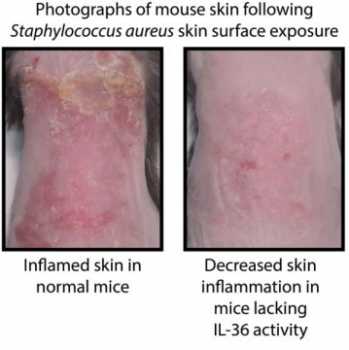09 Nov Toxin-Producing Bacteria Staph Aureus Induces Skin Inflammation
MedicalResearch.com Interview with:
Lloyd S. Miller, M.D., Ph.D.
Vice Chair for Research, Department of Dermatology
Associate Professor of Dermatology, Infectious Diseases, Orthopaedic Surgery & Materials Science and Engineering
Faculty Member, Cellular and Molecular Medicine (CMM) and Pathobiology Graduate Programs
Johns Hopkins Department of Dermatology
Baltimore, MD 21231
MedicalResearch.com: What is the background for this study? What are the main findings?
Response: Staphylococcus aureus is a common bacterial skin pathogen and its abundance is greatly increased on affected skin of eczema patients, especially during disease flares. However, how S. aureus induces skin inflammation and exacerbates the skin inflammation is incompletely understood.
In this study, we found that S. aureus exposure of mouse skin induced skin inflammation through an inflammatory mediator known as IL-36.
MedicalResearch.com: What should clinicians and patients take away from your report?
Response: A role for S. aureus in triggering IL-36 is an unexpected mechanism by which the host responds to pathogenic and virulent bacteria on the skin surface to promote cutaneous inflammation.
Our findings suggest that inhibition of IL-36 could serve a novel therapeutic approach to combat skin inflammation in eczema and other inflammatory skin diseases.
MedicalResearch.com: What recommendations do you have for future research as a result of this study?
Response: Our future research involves the investigation of the mechanisms by which IL-36 is induced and how it causes skin inflammation.
MedicalResearch.com: Thank you for your contribution to the MedicalResearch.com community.
Citation:
Haiyun Liu, Nathan K. Archer, Carly A. Dillen, Yu Wang, Alyssa G. Ashbaugh, Roger V. Ortines, Tracy Kao, Steven K. Lee, Shuting S. Cai, Robert J. Miller, Mark C. Marchitto, Emily Zhang, Daniel P. Riggins, Roger D. Plaut, Scott Stibitz, Raif S. Geha, Lloyd S. Miller. Staphylococcus aureus Epicutaneous Exposure Drives Skin Inflammation via IL-36-Mediated T Cell Responses. Cell Host and Microbe, 2017 DOI: 1016/j.chom.2017.10.006
Note: Content is Not intended as medical advice. Please consult your health care provider regarding your specific medical condition and questions.
[wysija_form id=”1″]
Last Updated on November 9, 2017 by Marie Benz MD FAAD


